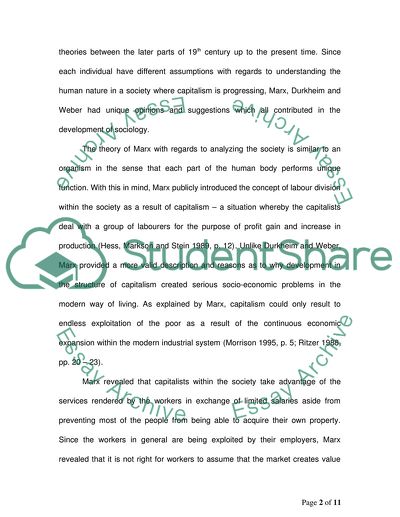Cite this document
(Understanding of the Idea of Society Essay Example | Topics and Well Written Essays - 2250 words, n.d.)
Understanding of the Idea of Society Essay Example | Topics and Well Written Essays - 2250 words. Retrieved from https://studentshare.org/sociology/1747809-referring-to-three-of-the-sociologists-examined-on-this-modulekarl-marx-mile-durkheim-max-weber-describe-evaluate-and-compare-their-contribution-to-an-understanding-of-the-idea-of-society
Understanding of the Idea of Society Essay Example | Topics and Well Written Essays - 2250 words. Retrieved from https://studentshare.org/sociology/1747809-referring-to-three-of-the-sociologists-examined-on-this-modulekarl-marx-mile-durkheim-max-weber-describe-evaluate-and-compare-their-contribution-to-an-understanding-of-the-idea-of-society
(Understanding of the Idea of Society Essay Example | Topics and Well Written Essays - 2250 Words)
Understanding of the Idea of Society Essay Example | Topics and Well Written Essays - 2250 Words. https://studentshare.org/sociology/1747809-referring-to-three-of-the-sociologists-examined-on-this-modulekarl-marx-mile-durkheim-max-weber-describe-evaluate-and-compare-their-contribution-to-an-understanding-of-the-idea-of-society.
Understanding of the Idea of Society Essay Example | Topics and Well Written Essays - 2250 Words. https://studentshare.org/sociology/1747809-referring-to-three-of-the-sociologists-examined-on-this-modulekarl-marx-mile-durkheim-max-weber-describe-evaluate-and-compare-their-contribution-to-an-understanding-of-the-idea-of-society.
“Understanding of the Idea of Society Essay Example | Topics and Well Written Essays - 2250 Words”, n.d. https://studentshare.org/sociology/1747809-referring-to-three-of-the-sociologists-examined-on-this-modulekarl-marx-mile-durkheim-max-weber-describe-evaluate-and-compare-their-contribution-to-an-understanding-of-the-idea-of-society.


